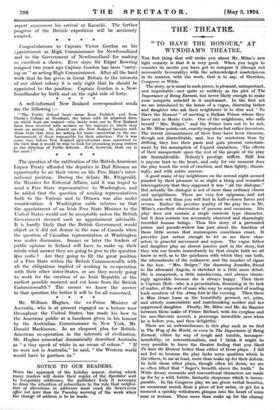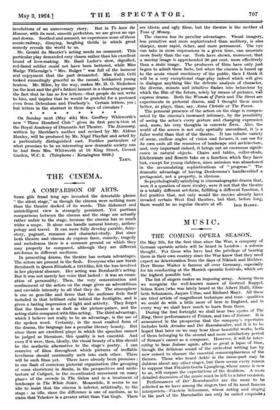THE • THEATRE.
" TO HAVE THE HONOUR," AT WYNDHAM'S THEATRE.
Tim first thing that will strike you about Mr. Milne's new light comedy is that it is very good. When you begin to consider its merits you have got to compare it (though not necessarily favourably) with the acknowledged masterpieces in its manner, with the work, that is to say, of Sheridan, Congreve or Wilde.
The story, as is usual in such pieces, is pleasant, unimportant, and improbable—not quite so unlikely as the plot of The Importance of Being Earnest, but never likely enough to make your complete unbelief in it unpleasant. In the first act we are introduced to the house of a vague, charming father and daughter who ask their neighbours in to dine and " To Have the Honour " of meeting a Balkan Prince whom they have met in Monte Carlo. One of the neighbours, who calls herself " Mrs. Bulger," and the Prince turn out to be not, as Mr. Milne points out, exactly impostors but rather inventors. The recent circumstances of their lives have been tiresome, though not discreditable, and, less by resolution than by drifting, they lose their pasts and gain present entertain- ment by the assumption of feigned characters. The effects of their masquerade upon the rest of the people of the play are inconsiderable. Nobody's prestige suffers. Still less is anyone hurt to the heart, and only for one moment does the play touch the cord of emotion, and then lightly, charm- ingly, and with entire success.
A good many of my neighbours on the second night seemed puzzled by their pleasure in so slight a thing and remarked interrogatively that they supposed it was " all the dialogue." But actually the dialogue is not of more than ordinary charm and sprightliness. There are very few epigrams, and not much more wit than you will find in half-a-dozen farces and revues. Rather the peculiar quality of the play lies in Mr. Milne's excellent observation of persons and occasions. His play does not contain a single outworn type character, but it does contain ten accurately observed and charmingly recorded human beings. Thus this story of a pretended prince and pseudo-widow has just about the function of those little scenes that mannequins sometimes enact. It provides just action enough to let us see these char- acters in graceful movement and repose. The vague father and daughter play an almost passive part in the story, but they win our hearts immediately by that simple faith we all know so well, as to the quickness with which they can bath, the whereabouts of the corkscrew, and the number of cigars in the box. " Mrs. Bulger," the charming Jennifer, friend to the aforesaid Angela, is sketched in a little more detail. She is competent, a little mischievous, and always charm- ingly agreeable because she is always happy. Then there is Captain Holt—who is a presentation, disarming in its lack of malice, of the sort of man who may be suspected of reading back numbers of the Army List in the evening. Then there is Miss Grace Lane as the beautifully gowned, set, prim, and utterly materialistic and matchmaking mother and her suppressed daughter. Finally, Mr. Milne and Mr. du Manner between them make of Prince Michael, with his eyeglass and his neo-Slavonic accent, a personage incredible save when he is before you, and then delightful.
There are no awkwardnesses in this play such as of find in The Way of the World, or even in The Importance of Being Earnest, either by way of rough and tumble, incompre- hensibility, or conventionalism, and I think it might be very possible to leave the theatre feeling that you liked To have the Honour better than either of those plays. I did not feel so because the play lacks some qualities which in the others, to me at least, more than make up for their defects. In both those other plays, though often let down, we are as often lifted that " finger's breadth above the truth." In Wilde dreary moments and conventional characters are made up for by a wild, brittle, fantastic eloquence which is incom- parable. In the Congreve play we are given verbal beauties, an occasional scorch from a piece of hot satire, or get for a moment a quickly withdrawn glimpse into the heart of some man or woman. These more than make up for the clumsy
involutions of an unnecessary story. 'But in To have the Honour, with its neat, smooth perfection, we are given no ups and downs. Soothed and amused, we experience none of those scenic-railway, dizzying, laughing thrills in which great comedy reveals the world to us.
- Mr. Gerald du Maurier's acting needs no comment. This particular play demanded easy charm rather than his excellent brand of love-making. Mr. Basil Loder's slow, dignified, red-faced soldier could not have been bettered, while Miss Madge Titheradge's " Mrs. Bulger " was full of the humour and enjoyment that the part demanded. Miss Faith Celli looked exceedingly graceful as the casual; bobhaired young hostess. Mr. Milne, by the way, makes Mr. H. 0. Nicholson (as the host and the girl's father) lament in a charming passage the fact that he has so few letters—that people do not write to him, and implies that he would be grateful for a postcard even from Debenham and Freebody's. Certain letters, yes ; but letters in the abstract in these days of circulars ?
* * * * * * * * On Sunday next (May 4th) Mrs. Geoffrey Whitworth's new " Three Hundred Club " gives its first proCu-tion at the Royal Academy of Dramatic Art Theatre. The Discovery, written by Sheridan's mother and revised by Mr. Aldous Huxley, will be produced by Mr. Nigel Playfair and acted by a particularly distinguished cast. Further particulars of what promises to be an interesting new dramatic society can be had from Mrs. Whitworth at 10 King Street, Covent Garden, W.C. 2. (Telephone : Kensington 8928.)
TARN.















































 Previous page
Previous page